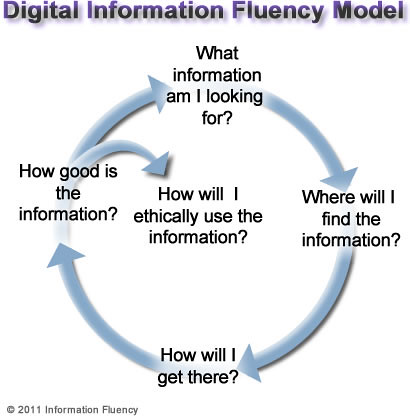With the shift to incorporate technology into our classrooms, we have to make students have information fluency skills. In other words, we should be able to find, evaluate, and use digital information effectively, efficiently and ethically. Information fluency can help us all make the most out of our experience on the web. We can begin by asking ourselves a few simple questions:
What am I looking for? 
Where will I look?
How will I get there?
How good is the information?
How will I ethically use this information?
These questions have students looking critically at the resources and information they may be acquiring from the internet. With the first question, students should be able to narrow their search – perhaps making their searches more concise, only including key words to eliminate unrelated material. Next, the students should decide through which outlets they will searching and how they will navigate the search engine(s) they chose. This would be a great time to introduce students to the sites that are efficient and easy to use! But once the students locate information on the web, they should be critical of it since not everything posted online is accurate or based on research; teach the students to become skeptical, but not cynical, of all the information they encounter on the web. There are ways to check that the content poster is reliable and unbiased, sharing information that is suitable for academic use. Finally, the student needs to consider how they will be utilizing this information and in what contexts. Of course, students need to be respectable to others on the web, but they also need to make sure they are citing their sources and giving credit where it is due. These steps should soon become an ingrained part of the students’ experiences on the web, as they constantly, yet subconsciously, ask themselves these questions.
Growing up in this 21st century world, our students will need to be well acquainted with the specialized skills that can aid in navigating online. When students learn to use information online in an appropriate manner, they will begin to notice the different literacies that are required for both print and digital resources. Check out this site for helping students “achieve their information needs.”



Add a comment